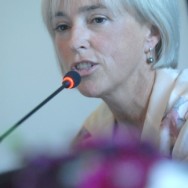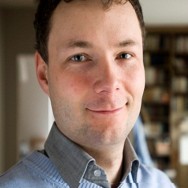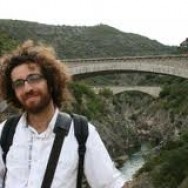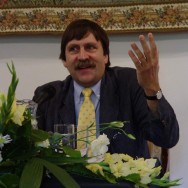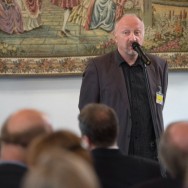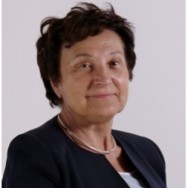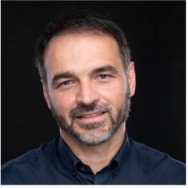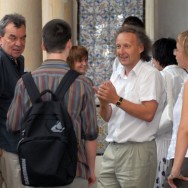Student of philology and philosophy at the universities in Cracow, Berlin and Freiburg (Germany). Researcher at the Jagiellonian University and the University in Tubingen, 1985 – 1989. Scholarship fellow of the Konrad-Adenauer-Foundation and the DAAD program. PhD at the University in Tübingen (Germany), 1994. Between 1993 - 1999 Counselor at the Polish Embassy in Bonn (Germany). Since September 1999 Director of the Corporate Representative Office DaimlerChrysler AG in Poland and Head of the Communication at DaimlerChrysler Automotive Polska. Since October 2006 President of the Global Road Safety Partnership in Poland, which is an international, non-governmental initiative, which brings together governments and governmental agencies, the private sector and civil society organizations to address road safety issues in low and middle income countries.
Experts
Michał Łuczewski
Deputy director of the Centre for Thought of John Paul II (Warsaw), assistant professor (Institute of Sociology, University of Warsaw), visiting scholar at the Centre for Social Studies (Warsaw), Columbia University (NY, Fulbright) and the Institute for Human Sciences (Vienna), an editor-in-chief of a scholarly, antidisciplinary journal “Stan Rzeczy/State of Things” and an editor of “44/Forty and four. An Apocalyptic Magazine”. He is co-/author of the following books: „Culture of remembrance in Poland and Germany” (2011), “Landscape value” (2011) and award-winning “Eternal Nation. Pole and Catholic in the village of Żmiąca” (2012). He specializes in historical sociology, sociology of nation and nationalism, sociotheology, social memory, Polish-German relations, and methodology of social sciences.
Mazen Maarouf
Mazen Maarouf is a Palestinian poet and writer. His three books of poetry are:“An Angel Suspended On The Clothesline” (Beirut, 2012), “The Camera Doesn’t Capture Birds” (1st edition 2004, 2nd edition 2010) and "Our Grief Resembles Bread"(Beirut, 2000). He took part in several internatrional poetry readings in Lebanon, Scotland and France. His poetry has been translated in English, French, German, Spanish, Swedish, Maltese and lately Icelandic and Chinese. Mazen Maarouf is now a writer in residency in (Iceland).
Zdzislaw Mach
Professor in sociology and anthropology at the Jagiellonian University. Founder and head of the Institute for European Studies at the Jagiellonian University, and one of the main authors of the European Studies curriculum in Poland. He has broad international teaching experience from Europe and America. Previous teaching and research appointments include Université Montpellier IIII Paul Valéry, University of Exeter, University College Dublin, University of Chicago, Oxford University, University of Amsterdam, the Netherlands Institute for Advanced Study, the American Council of Learned Societies, University of Edinburgh and St. John's College, Oxford. His research interests cover identity issues such as nationalism, minorities and ethnicity, the development of European citizenship, migration and the reconstruction of identity, the ethnic origin of a nation and construction of identities as well as the development of the idea of Europe.
Zbigniew Machej
Freelance writer, translator of both Czech and Slovak and a journalist. Currently Deputy Director of the International Visegrad Fund, he has had a long career working throughout the Visegrad countries. Educated in Krakow, where he completed a Masters of Arts in Comparative Religion. Following on from the completion of his Master's, he briefly thought Polish literature for a few years, before becoming Deputy Director of the Polish Institute in Prague in 1991. Since then, he has spent his time between helping organise Krakow's hosting of the European capital of culture in 2000, and returning to the Polish Institute in 2000. After leaving the institute again in 2004, he spent a couple of years focusing on journalism and writing. In 2006, Mr. Machej became Director of the Polish Institute in Bratislava where he remained until 2010.
Hanna Machińska
Hanna Machińska, Ph. D., is a lawyer and social activist with significant professional experience and accomplishments in implementing European legal standards, including those regarding human rights protection and anti-discrimination law, into the Polish legislative system. She has always been involved in the fight against discrimination, xenophobia and intolerance.
She is the author of a number of publications on human rights protection, including: Axiology in the European Union in the light of the European Convention on Human Rights, Protection of fundamental rights in the European Union, The idea of Europe (ed.), Poland and the Council of Europe, and Disabled persons in the labour market.
She received numerous awards, including those conferred by the Commissioner for Human Rights, the Minister for Foreign Affairs, the Minister of Education, the President of the Polish Bar Council, the Secretary General of the Council of Europe and the President of Austria.
Marcin Maciejewski
Future(s) Strategist, leading strategic R&D projects for future products and services.
He utilizes research along with trends, forces, and drivers (mega, macro, micro) to identify opportunities and materialize long-term innovations.
On a daily basis, he works at infuture.institute as a Business Foresight Advisor. He is a lecturer at SWPS University in Warsaw, AGH University of Science and Technology in Kraków.
He emphasizes kinesthetic learning, believing in the power of touch to understand better, lift to feel, build to grasp, and draw to experience.
Fascinated by changes in the world through the lens of human nature—behaviors, moods, thoughts, emotions, and imagination.
Monem Mahjoub
Is a Libian poet, writer, and political critic. He started his career as the founder of the monthly Fadaat (spaces) for culture and criticism (2002-2010). After that, he became the adviser of Sh'uun Dawliya (International Affairs) magazine until 2012, and then editor in chief of al-Mostaqil (The Independent) weekly magazine, in the years 2015-2016. In 2010 he received the State Prize, and in 2012 the Accolade of the Country by the Constitutional Though Association for "his activity to spread the culture of democracy, peaceful political action, renouncing violence, respecting the cultures of the Libyan social components and strong defense on the pan-Arab affiliation".
Konrad Maj
Konrad Maj, Ph.D., is the Head of SWPS University’s HumanTech Center for Social and Technological Innovation.
His research interests include media psychology, new technologies, social influence, and innovations, in particular Human-Robot-Interaction (HRI). He authored numerous articles published in academic journals.
From 2013 to 2016 he held the post of Representative of the Vice-Rector for Research, and was responsible for commercialization of research results and social innovations.
Dr. Maj is the Head of the HumanTech Meetings 1 and HumanTech Meetings 2 projects, an educational initiative exploring the link between social sciences and new technologies.
He collaborates with the Dutch Research Council (NWO) where he reviews grant applications. He is a member of the Program Council of the Digital Economy Congress (Kongres Gospodarki Elektronicznej). In 2021, Dr. Maj was named one of the top 25 alumni of the 25th Jubilee of SWPS University.

